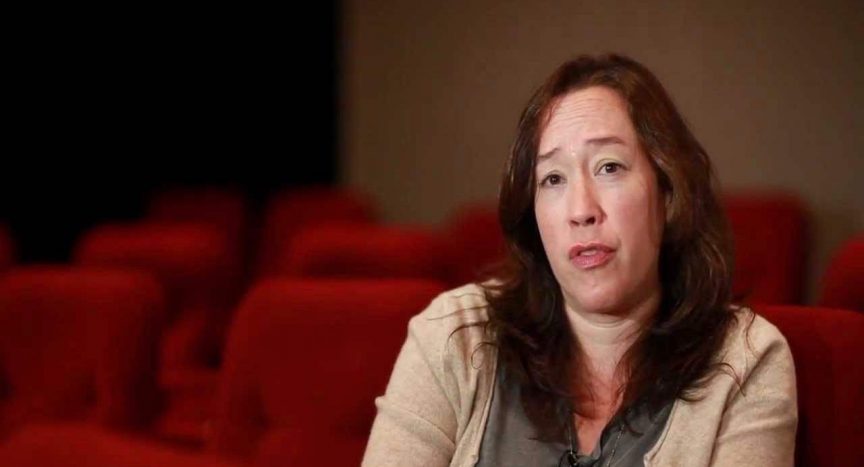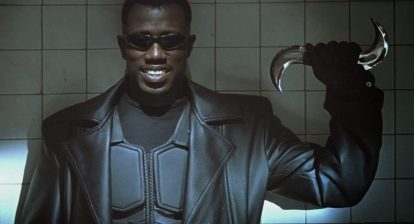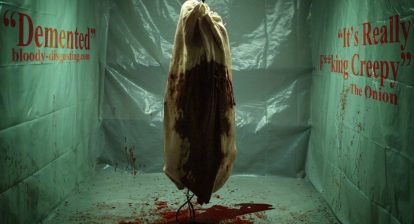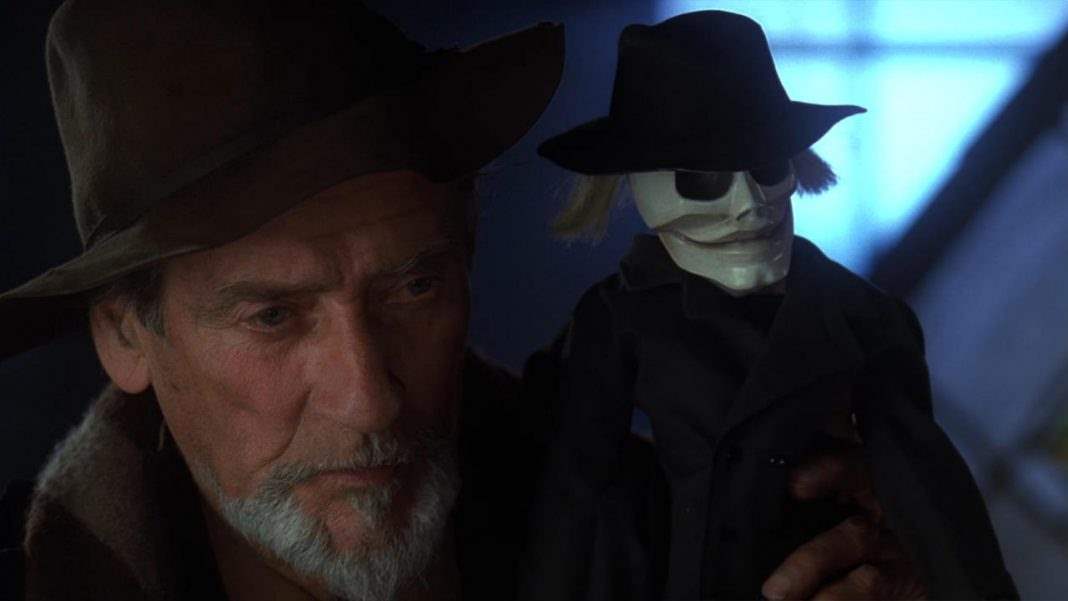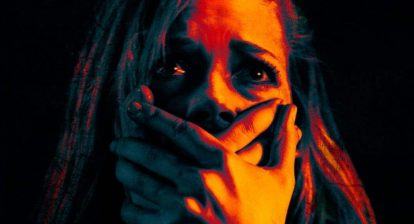Karyn Kusama is, I think, one of the strongest directors working today. She’s that very rare kind of filmmaker who has her own sense of style and story but can apply her vision to almost any type of film. From her stellar indie debut Girlfight to the studio blockbuster Aeon Flux and the heightened high school horrors of Jennifer’s Body, now she’s arrived at The Invitation.
Now streaming on Netflix, The Invitation is one of the strongest, most unsettling, character driven horrors of the year to date. It’s a movie about a dinner party that just starts unraveling and keeps unraveling from the very first scene. Even though you may have an idea where things are going, the narrative constantly keeps you second guessing yourself as both you and the main character, Will, struggle to make sure of what’s going on.
If you haven’t seen it already, it comes highly recommended. We had the pleasure of talking with Karyn Kusama about the challenges and rewards of working on this very compact but extremely effective film.
Wicked Horror: What was it about the script that most made you want to take on the project as director?
Karyn Kusama: It was really efficiently written and really economical in the way that it laid out the characters and the problems for the characters. I think even beyond that it was interesting to imagine this narrative structure where grief itself is kind of the nightmare of the movie and everything after that grief is just a sort of attempt at survival. And that’s metaphorical and emotional at the beginning and then literal by the end. Something about that metaphor really connected with me.
WH: One of the things I love so much about the movie is that—well, it’s teased out and there’s dread from the beginning, so it doesn’t feel exactly like a slow burn—but it’s so long into the movie before you actually know that anything out of the ordinary is happening…
Kusama: Right!
WH: And what were some of the challenges of that very deliberate sense of pacing?
Kusama: I think the biggest challenge is to maintain a couple of things: faith in the audience that at least somebody will respond to that kind of deliberate execution but also a patience myself with that kind of storytelling. It takes a kind of patience to tell a story like this with so many gut reactions from I want to say a more mainstream sensibility. I love the story, but can all of this stuff happen in the first ten minutes, essentially. That’s not how I felt the story would be at its most powerful, so I wanted to kind of push the limits of the audience the same way that the characters we’re watching are being pushed.

Kusama: Yeah, it’s interesting because on the one hand there’s a really nice camaraderie, the cast and crew get really comfy and get to know each other and on a surface level that’s a really easier thing to do on a production level. But to have twelve characters in a space together at some points connected to each other at other points connected to other characters, visually and emotionally, it meant having to know exactly what to shoot. We decided early on, and the script sort of demanded this, to remain in Will’s point of view through the movie.
The technical challenge was deciding when it was important to step back and see the whole group. Everybody has their own reality of the night. We had twenty days to shoot it so ultimately covering an hour and a half of twelve characters’ dialogue was actually quite daunting.
WH: Would you say it was more freeing or more difficult to come back to a sort of confined indie picture after working within the studio system?
Kusama: You know, I think the thing with indie films that are this small and that demand you really know what you’re doing is that you just have to answer the questions early and stick to exactly what the execution would need to be that’s wrapped up in the answers to all of those questions. I think, for me, I try to approach all of my filmmaking that way. But the target keeps moving often times when it comes to studio films. You’re bracing yourself for a desire on several smart people’s parts to sort of retro engineer a movie as you’re making it or while you’re finishing it. And that’s difficult. That’s the most difficult part of studio filmmaking, for me.
In some respects it was really freeing to just make a movie that felt like mine and, love it or leave it, it is what it is. I stand behind it knowing it has problems and knowing there are things I wish I could change, but ultimately it’s mine. I don’t know, I guess I would answer your question by saying that every movie has its challenges. But in this case I prefer the challenges of these smaller, more personal films.
 WH: With an ensemble piece like this that’s so focused on the actors, what was the casting process like?
WH: With an ensemble piece like this that’s so focused on the actors, what was the casting process like?
Kusama: It was really about sort of building the quilt, I guess, of the relationships among everybody. So we knew we wanted a fair amount of the diversity that you end up seeing on the screen, because that was first of all written into the script but also just seemed to reflect the world we were depicting, but beyond that it was kind of about just feelings and energies among people, light and dark. Sort of matching those.
Something about Tammy Blanchard, who plays Eden, and Logan, there’s a kind of storminess. And there’s something nice about imagining that there was probably a fair amount of passion in that relationship. And it’s with Kira that Logan’s character manages what actually appears to be a slightly more stable relationship. It was interesting just to be able to play with the feelings you get from certain actors.
WH: Since the film came out, I’ve heard people reading into the cult as New Age or Born Again and I’m wondering what the actual inspirations were behind that cult mentality in the film?
Kusama: I mean, I think the cult is meant to be its own thing. It’s its own belief system, but I hope that even in a specific audience people can start to see that there are patterns behind all kinds of thought movements that often have to do with social control and that have to do with submission, surrender, obedience… and in some respects that can be a really useful tool in someone’s life, particularly when their life is in chaos. But there can be really negative consequences to giving up your identity like that. In many respects I think the cult is based on the generalities that visit all of these thought movements, whether we call them cults or whether we call them world religions, there’s an element that winds up binding the most radical of all of them.
 WH: What was some of the direction you gave to the actors who were playing a part of the cult to get them to achieve that?
WH: What was some of the direction you gave to the actors who were playing a part of the cult to get them to achieve that?
Kusama: One of the things we talked a lot about while we were on set was this sense of the evening having a kind of relaxed build. Maybe one of the most offensive things one can do is not be present and just seem distant, seem not all there. And the irony of that of course is that most of us have to struggle to be present. It’s a lot of work, actually. So I wanted to work with this idea of “who’s engaged and who’s not” on a deeper level. And it was always Will who was kind of pulling away.
WH: Right. And with Will, who’s one of the most present and self-aware characters I’ve seen in a horror film in a long time, was it a difficult balance to maintain a character who is so aware that things are off from the get-go?
Kusama: That’s interesting. We had to play with the hyper-vigilance that’s just a part of his character all of the time and that’s definitely something I feel attuned to and understand. And we had to play with the way that hyper-vigilance veered very closely to outright paranoia. We had to pose the question that Will was simply in so much pain all the time that maybe he’s misreading the conversation. And the thing is, he is in a lot of pain and that’s really true and that could cause him to do something really dangerous. But I think in this case he’s someone who exhibits symptoms of paranoia but he happens to be right.
WH: In general, what is it that attracts you to the horror genre and keeps you interested and keeps you coming back?
Kusama: I think there’s a lot of opportunity with smart horror. There’s a lot of horror in the world. I feel like this is a way to get to our storytelling roots as humans, hearing fables and fairy tales and myths, that kind of help comfort us by being either object lessons or cautionary tales. It’s just a way to sort of organize and explore how complex it is, all of our fears in the world.
Featured Image Credit: Film Independent
